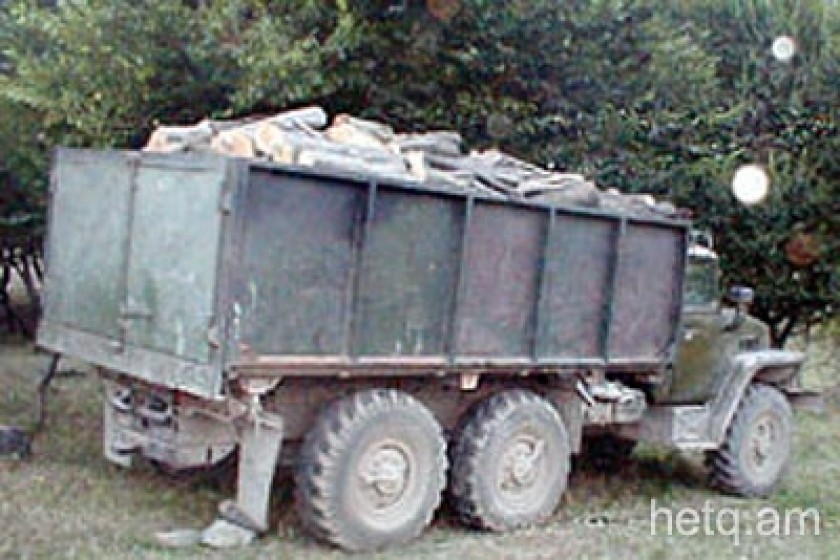
The Axe Keeps Swinging
"Nobody has the right to cut down trees; it's forbidden," says Samvel Kotsinyan, chief inspector at the Lori regional division of the Environmental Inspection Agency. But the real story in various parts of the province of Lori is very different; people cut the trees down whenever they can.
The forest is watched around the clock. In order to optimize its supervision of the forest, the agency says it relies on eyewitnesses or foresters to sound an alarm when they see trees being cut down.
But these assurances of around-the-clock supervision were challenged when, on August 19, we spotted a car loaded with timber in the forest near the village if Pambak. The car did not have state license plates. It stood waiting for about an hour, until 9 pm to be exact, probably for its owner. As it grew dark, we heard another car approaching. Vehicles came and went all night.
"An individual can go to the forestry service, pay money, and buy firewood," explained Kotsinyan. A car loaded with wood does not in itself imply illegal deforestation or transportation of wood. But what of the fact that the car had no license plates? "That's an illegal vehicle, that's different. The release permit is given only when the vehicle has been loaded. They have to know which vehicle has been loaded, don't they?" said Aram Grigoryan, head of the agency in Lori.
If a vehicle is being used illegally, then the permit it has been given to transport wood is also illegal. A permit to remove wood from a forest requires information including the full name of the person involved, the amount of wood transported, and the license plate number of the vehicle used. If any of this information is missing, the transfer is considered illegal and registered as such by the forester in charge or the Environmental Inspection Agency. Anyone transporting wood out of a forest must do so within one day; otherwise he must explain the delay, justify the use of another vehicle, or prove that the vehicle registered is unable to carry out the task.
"It's impossible. Whatever vehicle is used, it's impossible to control," said Edmon Gharakeshishyan, director of the subsidiary company Gugark Forestry Service. His forestry service has the difficult task of protecting and preserving forests spreading from the province of Shirak through Vandazor to Dsegh, including that of Pambak. This stretch of forest, more than 28,000 hectares in area, is supervised by seven local forestry divisions, each with its own head. Each division has subdivisions, with their own foresters. Each forester is responsible for an area of about 400-500 hectares. It is impossible for one person to cover that much territory without the necessary means of transport or communication.
"No matter what happens, even if a village is supplied with natural gas, the villagers there will cut down trees and transport them using donkeys, horses, cars, or their own bare hands," said Edmon Keshishyan.
Following a powerful gale in March 2004, the government prohibited cutting down any of the trees that were left standing. Instead, it allowed the removal of tress that had been blown down, which in the forest of Gugark, reached 2,500 cubic meters.
Despite supervision by foresters and a decrease in violations in recent years, lawlessness still abounds in the forests. Around 350 illegal incidents of improper logging were discovered last year in the Gugark forest alone, a few of which have been registered as criminal cases, and in some cases fines of 50,000-70,000 drams have been levied. The crack of an axe was last heard in the Gugark forest estate in August, and the culprit was fined. This year, environmental inspectors in Lori have registered 150 such violations. But the illegal logging continues.
 Videos
Videos Photos
Photos
Write a comment